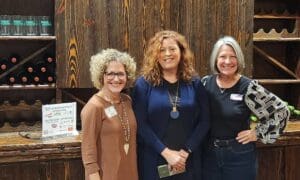A look into Fayette County’s possible future at the “Fayette Forward” event held March 7 at Pinewood Atlanta Studios came with comments from the county’s mayors on how Fayette can move forward and attract millennials.
The day-long event in Soundstage 8 centered largely on the millennial population, an age segment that continues to decrease significantly in Fayette County. The audience of several hundred heard the things that appeal to people in their late teens to mid-30s and how they might be attracted a county that is aging more rapidly than nearly anywhere in metro Atlanta.
The audience earlier in the day heard about successful endeavors in other areas that purposefully developed to attract millennials and other age groups.
A portion of the day’s event included comments from the county’s five municipalities on ways Fayette County can move forward.
Tyrone Mayor Eric Dial said his town is nicely situated geographically and has significant land available for development that would attract millennials. Tyrone is currently limited by its insufficient sewer capacity, though the town is exploring ways to increase that capacity, Dial said.
“It’s not the responsibility of government to drive the market,” Dial said continuing the thought. “Government provides the things needed then gets out of the way.”
Peachtree City Mayor Vanessa Fleisch noted the perception, of which she approved, of the city’s expensive lifestyle. That said, Fleisch noted the potential for additional housing stock through redevelopment.
Speaking of Fayetteville, Mayor Ed Johnson said the city cannot rely on “history” that is part of the official motto.
“We have to forge ahead. Change brings opportunity,” Johnson said. “We need to be engaged, not paralyzed. We can’t sit by — we have to make things happen.”
Johnson said actions such as adjusting development plans and making the city inviting for millennials and giving that age group a venue for leadership is a viable and appropriate course of action.
As the Atlanta Regional Commission and other representatives at the event emphasized, millennials today largely prefer city center living where working and living environments are in close proximity, along with a variety of social activities.
While Woolsey and Brooks might seem too far off the beaten path to accommodate those needs, Woolsey Mayor Gary Laggis and Brooks Mayor Dan Langford nonetheless advocated for the lifestyle in their communities.
With a population of 200 and a land mass of one square mile, Laggis said Woolsey has a handful of millennials who run home-based businesses.
Laggis, like Chick-fil-A CEO Dan Cathy did earlier in the meeting, said his three grown children do not live in Fayette County. Cathy said one of his sons lives in Buckhead and the other lives in a converted warehouse area by the river in Columbus.
Langford in his comments also noted the small Brooks community lacks much of what most millennials want. The feather in Brook’s cap, said Langford, is the Liberty Tech Charter School that will be opening in the summer.
“I think Brooks can bring a transformation on a smaller scale,” Langford said. “I think every area of Fayette has much to offer.”
Speaking of his community and the others, Johnson said, “The (need to create) balance is critical. Fayetteville has a lot of opportunities for the downtown. All the cities need to be strategic and benefit from each other.”
Dial agreed, saying the worst thing that could happen after the day’s event would be if people leave the meeting “and don’t do anything about it. Let’s take something from this and act on it.”













Leave a Comment
You must be logged in to post a comment.